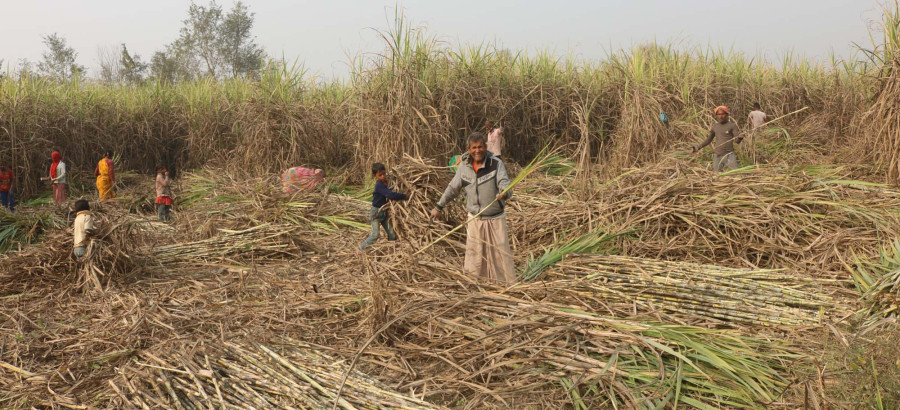Editorial
Honour thy farmer
Sugarcane producers are deep in debt as the government looks away.
In 2015-16, sugarcane farming in Nepal occupied 72,730 hectares of land, according to government statistics. The then cabinet had even directed the Ministry of Agriculture and Livestock Development to declare sugarcane a national crop, a status no crop had received before. The same year, the country produced 3.13 million tonnes of sugarcane, but the annual output has been dropping significantly in the last few years, hurting the national coffers, farmers and consumers.
According to the Sugarcane Producers Association, the number of sugarcane farmers is dropping significantly, and production ‘command areas’ of the crop have also seen a significant reduction in the past few years. Disillusioned over non-payment of outstanding dues and floor price adjustments, sugarcane farmers who are caught in a complex web of policy corruption and the business-politics nexus have been switching to cultivating other crops.
As the crushing season, which begins from mid-November, nears, the plight of sugarcane farmers has come to light once again as they raise their demands for payment of arrears by sugar mills. The dues go as far back as the fiscal year 2014-15 and run into millions. The association has also demanded that unpaid salaries of mill workers be paid and the factories reopened as hundreds of employees have lost their income source amid the evolving situation of the Covid-19 pandemic.
In December last year, Minister for Industry, Commerce and Supplies Lekhraj Bhatta had summoned the defaulting mill owners, who pledged to release the payment within a month and a half, following two weeks of protests in the capital by sugarcane farmers. However, not a penny has been released, according to the association. Nothing has changed for the farmers nine months since the government pledged to make the sugar mills pay them their money and work on an automated system to fix sugarcane prices.
The business-politics nexus in the country has never been laid this bare. The delay in releasing outstanding dues exposes how industrialists enjoy state protection while the issues of thousands of farmers remain unaddressed as bitter financial burdens haunt them. As a result, the conflict between sugarcane cultivators and sugar producers has become an annual ritual with several agreements made in the past. But farmers continue to struggle to get what is rightfully theirs. All this despite government warnings that mill owners could face arrest if they do not pay farmers on time.
Sugarcane farmers have not received more than an estimated Rs800 million from sugar mills for their crops and Rs1 billion in government subsidies. The financial burdens of the farmers are real. The government must ensure that the agreement reached between the three parties is honoured. It must win back the faith of thousands of disillusioned farmers while strongly regulating the 13 sugar mills operating across the country as it has been reported that some mills do not even have payment records.
Last year, following widespread criticism of the ad hoc restrictions on the import of sugar imposed in the fall of 2018, Prime Minister KP Sharma Oli claimed that the private sector had duped him, but his government has done nothing to change its policies. The manner in which the government continues to favour business people over sugarcane farmers and consumers is just one instance of crony capitalism. The government led by the Nepal Communist Party—an amalgamation of two communist forces that claim to champion the cause of the people—must guarantee that the economic equality, prosperity and social justice enshrined in the constitution also reflects in practice.




 13.12°C Kathmandu
13.12°C Kathmandu














